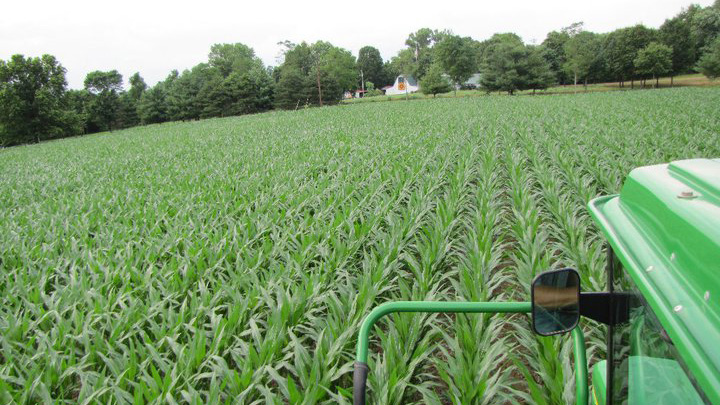Biological N Fixation Products for Corn: An Update
Biological N Fixation Products for Corn: An Update

Replacing, economically, some or all of corn’s fertilizer nitrogen (N) need with biological N fixation (BNF) is becoming a major goal in commercial corn production. With BNF, microbes fix atmospheric N as ammoniacal N and provide additional N nutrition to the crop. Several BNF products have reached the marketplace and questions regarding their efficacy are rising. Field research evaluating these products is ongoing. This article is intended to review the work that we and some others have done.
Just to our north, in Illinois, field research at 2 sites over 3 years (total of 4 site-years). These authors (Woodward et al., 2025), after averaging their data across the site-years, found that the BNF product, PROVEN 40TM (Pivot Bio), significantly raised yield by 1.8 bu/acre, regardless of the applied N rate, which ranged from 0 to 200 lb N/acre. The grain yield N response was quite positive, averaging 106.1 bu/acre at 0 lb N/acre and 186 bu/acre at 200 lb N/acre (Table 1, right side). These results, on average, indicate that the benefit to the biological product was unrelated to crop N status, whether clearly deficient or entirely sufficient.
When one digs into the supporting information provided with this report (Woodward et al., 2025, suppmat), a more detailed picture emerges (Table 1). At all four site-years corn gave large, positive responses to fertilizer N addition. Only one site-year (Champaign, 2019), the lowest yielding site-year, exhibited a significant positive yield response to the BNF product (+4.6 bu/acre). There was a significant interaction between BNF and N rate on yield for the Champaign, 2020 site-year, where, depending upon the N rate, BNF addition resulted in both lower and higher yield relative to the yield in the absence of BNF. The authors did not explain why they chose to ignore the lack of a positive yield response to the BNF for 3 of 4 site-years and then averaged that response over all 4 site-years of data.
Here in Kentucky, Chad has also looked at PROVEN 40TM BNF product use in no-till corn that was planted into a heavy cereal rye cover crop (Nalley and Lee, 2024). In the first year, 2023, the treatments consisted of two N rates, 140 and 180 lb N/acre, both without and with the BNF product. As was observed in Illinois, there was no interaction between the N rate and the use of PROVEN 40 TM on corn grain yield. The 140 and 180 lb N/acre rates averaged 199 and 191 bu/acre, respectively, and were not significantly different, statistically. Corn yields with PROVEN 40 TM, at both N rates, averaged 200 bu/acre and were 9 bu/acre better than N applied without the BNF. This difference was statistically significant. Again, the positive impact due to the biological product was not related to the applied N rate. There was speculation that the in-furrow BNF product was beneficial because the decomposing rye cover crop was having a negative impact on corn N nutrition across both fertilizer N rates.
In 2024, Chad’s no-till corn followed rye killed either five or two weeks before planting (Lee et al., 2025), resulting in different levels of decomposing rye residue at planting. Three N rates (170, 215 and 260 lb N/acre) were applied, both without and with PROVEN 40TM. In the figure below, the lower amount of rye residue resulting from the cover crop kill five weeks before planting improved corn yield response to the higher N rate treatments, but there was no impact of PROVEN 40TM. With the heavier rye residues from killing the cover crop only 2 weeks before planting, there was a trend for greater yield with use of PROVEN 40TM, regardless of N rate, though the positive yield difference was only statistically significant at 215 lb N/acre. Again, the results indicated that the BNF improved crop yield but not crop N nutrition.
John evaluated the BNF Utrisha N TM (Corteva) in 2022 on two soils (Crider, Sadler) and at each of five fertilizer N rates (0, 50, 100, 150 and 200 lb N/acre). In the figures below one can see there was a good corn yield response to fertilizer N rate but no consistent response to the BNF, even at the lower N rates where some benefit to a BNF product might be expected.
A general lack of corn yield response to BNF products has been widely observed. In the North Central region, 61 site-years of field work with corn, spring wheat, sugar beet and canola, in 10 states, resulted in only two site-years where a positive yield benefit to a BNF product was found. More important than the lack of yield benefit to the use of BNF products is that we cannot predict where or when a BNF product might work, and with a lower probability of benefit, that predictability is critical to grower success with these products. The potential benefit to BNF use in the presence of heavy cover crop biomass decomposition is an interesting possibility and worthy of further investigation.
References
Franzen, D., J. Camberato, E. Nafziger, D. Kaiser, K. Nelson, G. Singh, D. Ruiz, E. Lentz, K. Steinke, J.H. Grove, E.L. Ritchey, L. Bortolon, C. Rosen, B. Maharjan and L. Thompson. 2023. Performance of Selected Commercially Available Asymbiotic N-fixing Products in the North Central Region. SF2080. NDSU Extension, Fargo, ND. https://www.ndsu.edu/fileadmin/snrs/Files/SF2080_Performance_of_Selected_N-fixing_Products.pdf
Lee, C., C. Nye and J. Bush. 2025. Evaluating impact of N uptake of corn with PROVEN 40 seed treatment with various N rates and cover crop termination. 2024 Corn Research Report. Martin-Gatton College of Agriculture, Food and Environment. Grain and Forage Center of Excellence.
Nalley, R., and C.D. Lee. 2024. Corn yield response to Pivot Bio PROVEN40. 2023 Corn Research Report. Martin-Gatton College of Agriculture, Food and Environment. Grain and Forage Center of Excellence.
Woodward, L.P., C.N. Sible, J.R. Seebauer and F.E. Below. 2025. Soil inoculation with nitrogen-fixing bacteria to supplement maize fertilizer need. Agron. J. 117:e21729. https://doi.org/10.1002/agj2.21729
Woodward, L.P., C.N. Sible, J.R. Seebauer and F.E. Below (suppmat). 2025. Soil inoculation with nitrogen-fixing bacteria to supplement maize fertilizer need. Agron. J. 117:e21729. agj221729-sup-0001-suppmat.
Citation: Grove J., Lee, C., 2025. Biological N Fixation Products for Corn: An Update. Kentucky Field Crops News, Vol 1, Issue 3. University of Kentucky, March 14, 2025.

Dr. John Grove, UK Soils Research & Extension
(859) 568-1301
jgrove@uky.edu

Dr. Chad Lee, Director- Grain & Forage Center of Excellence
UK Grain Crops Specialist
(859) 257-3203
Chad.Lee@uky.edu
